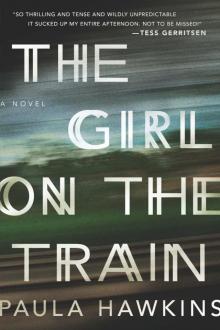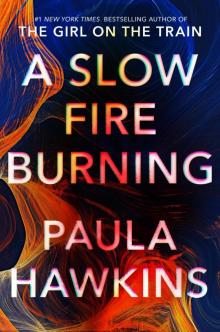- Home
- Paula Hawkins
Into the Water Page 22
Into the Water Read online
Page 22
He pulled the car over to the side of the road again, not to be sick this time, but to weep. For himself, for his ruined life. He cried racking sobs of frustration and despair; he beat his right hand against the steering wheel again and again and again, until it hurt as much as the left one.
Katie was fifteen years and two months old the first time they slept together. Another ten months and she would have been legal. They would have been untouchable—legally, in any case. He’d have had to walk away from the job and some people might still have thrown stones, they’d still have called him names, but he could have lived with that. They could have lived with it. Ten fucking months! They should have waited. He should have insisted they wait. Katie was the one in a hurry, Katie was the one who couldn’t stay away, Katie was the one who forced the issue, who wanted to make him hers, undeniably. And now she was gone, and he was the one who was going to pay for it.
The unfairness of it rankled, it seared his flesh like acid, and the vise just kept squeezing, tighter and tighter, and he wished to God it would just crush him, split his head open, and like her, like Katie, he’d be done with it.
LENA
I was frightened when I woke up, I didn’t know where I was. I couldn’t see a thing. It was totally dark. But I realized from the noise, the movement and the smell of petrol that I was in a car. My head was really sore and my mouth, too. It was hot and stuffy and there was something digging into my back, something hard, like a metal bolt. I wiggled my hand round behind my back to try to grab it, but it was attached.
That was a shame, because what I really needed was a weapon.
I was frightened, but I knew I couldn’t let my fear get the better of me. I needed to think clearly. Clearly and fast, because sooner or later the car was going to stop and then it was going to be him or me, and there was no way that he was going to do for Katie and Mum and me. No fucking way. I had to believe it, had to keep telling myself over and over: this was going to end with me alive and him dead.
Over the weeks since Katie died, I’d thought about a lot of ways to make Mark Henderson pay for what he’d done, but I never considered murder. I’d thought about other things: painting things on his walls, smashing his windows (been there, done that), calling his girlfriend to tell her everything Katie had told me: how many times, when, where. How he liked to call her “teacher’s pet.” I thought about getting some of the guys in the year above to kick the shit out of him. I thought about cutting off his dick and feeding it to him. But I didn’t think about killing him. Not until today.
How did I end up here? I can’t believe how stupid I was to let him get the upper hand. I should never have gone to his house, not without a clear plan, not without knowing exactly what I was going to do.
I didn’t even think, I was just making it up as I went along. I knew that he was coming back from holiday—I’d heard Sean and Erin talking about it. And then, after everything Louise said, and after the conversation I had with Julia about how it wasn’t my fault or Mum’s, I just thought, you know what? It’s time. I just wanted to stand in front of him and make him share a little in the blame. I wanted him to admit it, to admit what he’d done and that it was wrong. So I just went there, and I’d already smashed the window of the back door, so it was easy enough getting in.
The house smelled dirty, like he’d gone away without emptying the rubbish or something. For a while, I just stood in the kitchen and used the torch on my phone to look around, but then I decided I’d turn on the light, because you wouldn’t be able to see it from the road, and even if his neighbours saw it, they’d just think he’d come home.
It smelled dirty because it was dirty. Disgusting, actually—washing-up in the sink and ready-meal cartons with bits of food still stuck in them, and all the surfaces coated in grease. And shitloads of empty red-wine bottles in the recycling bin. It’s not how I expected it would be at all. From the way he was at school—always really neatly dressed and his fingernails clean, clipped close—I thought he’d be kind of anal.
I went through to the living room and scanned around using my phone again—I didn’t turn the light on in there in case you could see it from the road. It was so ordinary. Cheap furniture, lots of books and CDs, no pictures on the walls. It was ordinary and dirty and sad.
Upstairs was even worse. The bedroom was rank. The bed was unmade, the wardrobes open, and it smelled bad—different from downstairs, it smelled sour and sweaty, like a sick animal. I closed the curtains and turned on the bedside light. It was even worse than downstairs, it looked like somewhere someone old would live—ugly yellow walls and brown curtains and clothes and papers on the floor. I opened a drawer and there were earplugs and nail clippers inside. In the bottom drawer, there were condoms and lube and fluffy cuffs.
I felt sick. I sat down on the bed, and then I noticed that the sheet had pulled away from the mattress a bit in the opposite corner and I could see a brown stain underneath. I actually thought I was going to vomit. It was painful, physically painful, to think about Katie being here with him in this horrible room in this disgusting house. I was ready to leave. It was a stupid idea anyway, going there without a plan. I turned off the light and went back downstairs, and I was almost at the back door when I heard a noise from outside, footsteps coming up the path. And then the door swung open and there he was. He looked ugly, his face and eyes red, his mouth open. I just went for him. I wanted to scratch his eyes out of his ugly face, I wanted to hear him scream.
I don’t know what happened then. He fell, I think, and I was on my knees, and something skittered across the floor towards me. A piece of metal, like a key. I reached for it, and found that it wasn’t jagged, but smooth. A circle. A silver circle with a black onyx clasp. I turned it over in my hand. I could hear the kitchen clock ticking loudly, and the sound of Mark’s breath. “Lena,” he said, and I looked up and met his eye and I could see that he was afraid. I got to my feet. “Lena,” he said again, and he stepped towards me. I could feel myself smiling, because out of the corner of my eye I’d spotted another silver thing, a sharp thing, and I knew exactly what I was going to do. I was going to take a breath and steady myself, and I was going to wait until he said my name one more time, and then I was going to take the scissors that were lying on the kitchen table and I was going to jam them into his fucking neck.
“Lena,” he said, and he reached for me, and everything happened really fast after that. I grabbed the scissors and I went for him, but he’s taller than me and his arms were raised and I must have missed, mustn’t I? Because he isn’t dead, he’s driving, and I’m stuck back here with a bump on my head.
I started yelling, stupidly, because, seriously, who was going to hear me? I could tell the car was moving fast, but I yelled anyway, Let me out, let me out, you stupid bastard! I banged my fists on the metal hood above me, screaming as loud as I could, and then suddenly, bang! The car stopped moving and I slammed into the edge of the car boot, and then I let myself cry.
It wasn’t just the pain. For some reason I kept thinking about all those windows we broke, Josh and I, and about how much it would have upset Katie. She would hate this, all of it: she’d hate her brother having to tell the truth after months of lying, she’d hate me being hurt like this, but most of all she’d hate those broken windows, because they were the thing she dreaded. Broken windows and paedo scrawled on the walls and shit through the letter box and journalists on the pavement and people spitting, throwing punches.
I cried for the pain and I cried because I felt bad for Katie, for how this would have broken her heart. But you know what, K? I found myself whispering to Katie, like a madwoman, like Julia muttering to herself in the dark. I’m sorry. I’m really sorry, because that isn’t what he deserves. I can say this now, because you’re gone and I’m lying in the boot of his car with my mouth bleeding and my head split open, I can say this categorically: Mark Henderson doesn’t deserve to be hounded or beaten. He deserve
s worse. I know you loved him, but he didn’t just ruin your life, he’s ruined mine, too. He killed my mother.
ERIN
I was in the back office with Sean when the call came in. A pale young woman with a stricken expression stuck her head around the door. “There’s another one, sir. Someone spotted her from up on the ridge. Someone in the water, a young woman.” From the look on Sean’s face, I thought he was going to heave.
“There can’t be,” I said. “There’s uniforms all over the place. How can there be another one?”
• • •
BY THE TIME we got there, there was a crowd on the bridge, uniforms doing their best to keep them up there. Sean ran and I followed, we hammered along under the trees. I wanted to slow down, I wanted to stop. The last thing on earth I wanted to see was them pulling that girl out of the water.
It wasn’t her, though, it was Jules. She was already on the bank when we got there. There was a weird sound in the air, like a magpie scolding. It took me a while to realize that it was coming from her, from Jules. The chattering of her teeth. Her entire body shook, her sodden clothes clung to her pitifully thin frame, which folded in on itself like a collapsing deck chair. I called her name and she stared up at me, her bloodshot eyes looking straight through me, as though she couldn’t focus, as though she didn’t register who I was. Sean took off his jacket and put it around her shoulders.
She muttered, trance-like. She wouldn’t say a word to us; she hardly seemed to notice we were there. She just sat, trembling, glowering at the black water, her lips working the way they did when she saw her sister on the slab, soundless but purposeful, as though she were having an argument with some unseen adversary.
The relief, such as it was, lasted barely a few minutes before the next crisis hit. The uniforms who’d gone to welcome Mark Henderson home from his holiday had found his house empty. And not just empty, bloody: there were signs of a struggle in the kitchen, blood smeared all over the floor and the door handles, and Henderson’s car was nowhere to be found.
“Oh Christ,” Sean said. “Lena.”
“No,” I cried, trying to convince myself as well as Sean. I was thinking about the conversation I’d had with Henderson, the morning before he left for his holiday. There was something about him, something weak. Something wounded. There is nothing more dangerous than a man like that. “No. There were uniforms at the house, they were waiting for him, he couldn’t have—”
But Sean was shaking his head. “No, they weren’t. They weren’t there. There was a bad smash on the A68 last night and it was all hands on deck. A decision was taken to redeploy resources. There was no one at Henderson’s house, not until this morning.”
“Fuck. Fuck.”
“Quite. He’ll have come back and seen the windows all smashed up and jumped to the right conclusion. That Lena Abbott told us something.”
“And then what—he went to her house and took her and brought her back to his place?”
“How the hell should I know?” Sean snapped. “This is our fault. We should have been watching the house, we should have been watching her . . . It’s our fault she’s gone.”
JULES
The policeman—not one I’d met before—wanted to come into the house with me. He was young, twenty-five perhaps, although his hairless, cherubic face made him look even younger. As kind as he appeared, I insisted he leave. I didn’t want to be alone with a man in the house, no matter how harmless he looked.
I went upstairs and ran myself a bath. Water, water, everywhere. I had no great desire to be immersed in water again, but I could think of no better way to drive the chill from my bones. I sat on the edge of the tub, biting my lip to stop my teeth from chattering, my phone in my hand. I kept ringing Lena’s number, over and over, I kept hearing her cheery message, her voice full of a light I’ve never heard when she speaks to me.
When the bath was half full, I lowered myself in, my teeth gritted against panic, my heartbeat rising as my body sank. It’s OK, it’s OK, it’s OK. You said that. That night, when we were in here together, when you poured hot water over my skin, when you soothed me. It’s OK, you said. It’s OK, Julia. It’s OK. It wasn’t, of course, but you didn’t know that. All you thought had happened was that I’d had an awful day, been made fun of, humiliated, rejected by a boy I liked. And finally, in an act of extreme melodrama, I’d gone to the Drowning Pool and flung myself in.
You were angry because you thought I’d done it to hurt you, to get you into trouble. To make Mum love me more, even more than she already did. To make her reject you. Because it would have been your fault, wouldn’t it? You had bullied me, and you were supposed to be keeping an eye on me, and this had happened on your watch.
I turned the tap with my toe and let my body slip down into the tub; my shoulders submerged, my neck, my head. I listened to the sounds of the house, distorted, muffled, made alien by the water. A sudden thump made me jerk upwards into the cold air. I listened. Nothing. I was imagining things.
But when I slipped back down I was sure I heard a creak on the stairs, footsteps, slow and regular, along the corridor. I sat bolt upright, gripping the edge of the tub. Another creak. A door handle turning.
“Lena?” I called out, my voice sounding childish, reedy and thin. “Lena, is that you?”
The answering silence rang in my ears, and in it I imagined I heard voices.
Your voice. Another of your phone calls, the first one. The first one after our fight at the wake, after the night when you asked that terrible question. It wasn’t long after—a week, maybe two—when you rang late at night and left me a message. You were tearful, your words slurred, your voice barely audible. You told me you were going back to Beckford, you were going to see an old friend. You needed to talk to someone, and I was no use. I didn’t think about it at the time, I didn’t care.
Only now I understood, and I shivered despite the warmth of the water. All this time I’ve been blaming you, but it should have been the other way around. You went back to see an old friend. You were looking for solace because I rejected you, because I wouldn’t talk to you. And you went to him. I failed you, and I kept on failing you. I sat up again, my arms wrapped tightly around my knees, and the waves of grief just kept coming: I failed you, I hurt you, and the thing that kills me is that you never knew why. You spent your whole life trying to understand why I hated you so much, and all I had to do was tell you. All I had to do was answer when you called. And now it was too late.
There was another noise, louder—a creak, a scrape, I wasn’t imagining it. There was someone in the house. I pulled myself out of the bath and dressed as quietly as I could. It’s Lena, I told myself. It is. It’s Lena. I crept through the upstairs rooms, but there was no one there, and from every mirror my terrified face mocked me. It’s not Lena. It’s not Lena.
It had to be, but where would she be? She’d be in the kitchen, she’d be hungry—I’d go downstairs and there she would be with her head stuck in the fridge. I tiptoed down the stairs, across the hall, past the living-room door. And there, out of the corner of my eye, I saw it. A shadow. A figure. Someone sitting on the window seat.
ERIN
Anything was possible. When you hear hooves you look for horses, but you can’t discount zebras. Not out of hand. Which is why, while Sean took Callie to have a look at the scene at Henderson’s place, I’d been dispatched to speak to Louise Whittaker about this “confrontation” she’d had with Lena just before Lena disappeared.
When I got to the Whittakers’ house, Josh answered the door, as he always seemed to do. And, as always seemed to be the case, he looked alarmed to see me. “What’s going on?” he asked. “Have you found Lena?”
I shook my head. “Not yet. But don’t worry . . .”
He turned away from me, shoulders slumped. I followed him into the house. At the bottom of the stairs he turned back to face me. “Is it because of Mum that sh
e ran away?” he asked, his cheeks reddening a little.
“Why would you ask that, Josh?”
“Mum made her feel bad,” he replied sourly. “Now that Lena’s mum’s not alive, she blames Lena for everything. It’s stupid. It’s as much my fault as hers, but she blames her for everything. And now Lena’s gone,” he said, his voice rising. “She’s gone.”
“Who are you talking to, Josh?” Louise called from upstairs. Her son ignored her, so I responded. “It’s me, Mrs. Whittaker. DS Morgan. Can I come up?”
Louise was wearing a grey tracksuit that had seen better days. Her hair was pulled back, her face wan. “He’s angry with me,” she said by way of greeting. “He blames me for Lena’s running off. He thinks it’s my fault.” I followed her along the landing. “He blames me, I blame Nel, I blame Lena, round and round and round we go.” I stopped in the bedroom doorway. The room was all but empty, bed stripped, wardrobe empty. The pale lilac walls bore the scars of hastily removed Blu-Tack. Louise smiled wearily. “You can come in. I’m almost done in here.” She kneeled down, returning to the task I must have interrupted, which was placing books into cardboard boxes. I squatted down at her side to help, but before I was able to pick up my first book, she placed her hand firmly on my arm. “No, thank you. I’d rather do this myself.” I stood up. “I don’t mean to be rude,” she said, “I just don’t want other people to touch her things. It’s silly, isn’t it?” she said, looking up at me, eyes shining. “But I only want her to have touched them. I want there to be something left of her, on the book jackets, on the bedclothes, on her hairbrush.” She stopped and took a deep breath. “I don’t seem to be making a lot of progress. Moving on, moving past things, moving at all . . .”

 Girl on the Train
Girl on the Train The Girl on the Train
The Girl on the Train Into the Water
Into the Water A Slow Fire Burning
A Slow Fire Burning